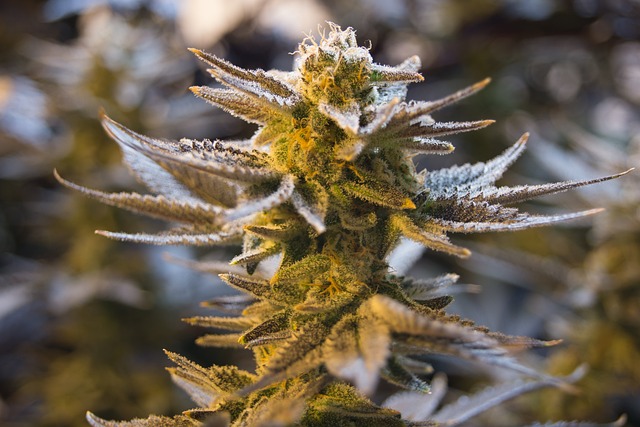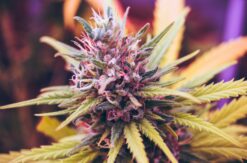Checking out the Potential of THCa: Is THCa comparable to THC?
Worldwide of cannabis, thc a flower reigns supreme as the cannabinoid most demanded for its psychedelic impacts. Nevertheless, there’s a lesser-known gamer in the mix– THCa. Found perfectly in raw cannabis, THCa has actually been getting interest for its potential therapeutic benefits and one-of-a-kind buildings. However the inquiry remains: Is THCa just as good as THC? Let’s explore the ins and outs of both cannabinoids to discover the reality behind this inquiry.
Recognizing THCa and THC:
THCa, or tetrahydrocannabinolic acid, is the precursor to THC, the popular psychoactive compound in marijuana. In its raw kind, cannabis mainly contains THCa instead of THC. Just with decarboxylation, commonly by home heating, does THCa convert into THC, the substance in charge of the blissful high related to cannabis usage.
THCa is discovered in the trichomes of the marijuana plant, those little resinous glands that create cannabinoids and terpenes. Unlike THC, THCa does not induce psychedelic results, indicating it will not obtain you high when eaten in its raw state. Instead, THCa supplies potential healing advantages without the intoxicating effects typically connected with THC consumption.
Possible Advantages of THCa:
Research into the prospective advantages of THCa is still in its early stage, however early findings recommend encouraging healing residential or commercial properties. Some studies suggest that THCa might have anti-inflammatory, neuroprotective, and antiemetic buildings, making it a potential prospect for various medical applications.
One study released in the British Journal of Pharmacology located that THCa showed significant anti-inflammatory effects in a computer mouse design of intense inflammation. Another study published in the journal Future Medicinal Chemistry recommended that THCa might have neuroprotective residential properties, potentially using benefits for problems like Parkinson’s disease and Alzheimer’s disease.
Furthermore, THCa has actually revealed promise as an antiemetic, meaning it may assist alleviate nausea or vomiting and vomiting. This property could be particularly useful for individuals undergoing chemotherapy or experiencing nausea because of various other clinical problems.
THCa vs. THC: Secret Differences:
While THCa and THC share a comparable molecular framework, they apply various effects on the body because of their distinctive interactions with the endocannabinoid system (ECS). THC binds directly to cannabinoid receptors in the ECS, largely turning on the CB1 receptor, which is accountable for the psychoactive results of cannabis.
On the other hand, THCa does not straight bind to cannabinoid receptors in the same way as THC. Instead, THCa engages with the ECS with indirect mechanisms, regulating numerous physiological procedures without evoking psychedelic impacts. This distinction in binding affinity and activation pathways accounts for the different impacts of THCa and THC.
Furthermore, THCa exhibits better stability than THC, specifically when subjected to heat or light. This security permits THCa to preserve its restorative buildings also after processing, making it an attractive option for medical use.
Discovering the Entourage Result:
One principle that further complicates the contrast in between THCa and THC is the entourage impact. The entourage effect recommends that the combined activity of several cannabinoids, terpenes, and other compounds found in cannabis produces a synergistic impact that improves restorative results.
In this context, THCa plays a vital function as one of the many elements contributing to the entourage result. When taken in alongside various other cannabinoids and terpenes, THCa might boost the total healing effectiveness of cannabis-based products, giving a much more detailed spectrum of benefits than separated THC alone.
Demystifying THCa: Does THCa Produce a High?
In the realm of marijuana, the limelight typically shines on THC (tetrahydrocannabinol) as the primary wrongdoer responsible for the blissful high connected with marijuana usage. Nonetheless, there’s an additional cannabinoid that usually flies under the radar– THCa (tetrahydrocannabinolic acid). Found abundantly in raw cannabis, THCa elevates intriguing concerns, particularly regarding its psychedelic residential properties. The burning question persists: Does THCa generate a high? Allow’s start an exploration of THCa’s attributes to unravel the truth behind this enigmatic compound.
Understanding THCa:
THCa, or tetrahydrocannabinolic acid, is the forerunner to THC, the prominent psychoactive part located in cannabis. In its raw kind, cannabis mostly contains THCa as opposed to THC. Only via a procedure called decarboxylation, commonly achieved via warm direct exposure, does THCa convert into THC, thus unlocking its psychedelic potential.
THCa resides primarily in the trichomes of the cannabis plant– those tiny, glandular structures that embellish its surface area. Unlike THC, THCa does not cause envigorating results when eaten in its raw state. Instead, it uses a series of possible restorative benefits without the psychedelic high frequently related to THC consumption.
Potential for Psychoactivity:
While THCa itself is non-psychoactive, some argument borders its possible to produce a high under details scenarios. This argument comes from unscientific records and emerging research study suggesting that eating big amounts of raw marijuana, rich in THCa, may cause refined psychedelic impacts in some individuals.
Although THCa does not directly bind to cannabinoid receptors in the same manner as THC, it connects with the endocannabinoid system (ECS) with indirect systems. Some scientists suppose that high doses of THCa, especially when consumed alongside various other cannabinoids and terpenes, may elicit mild psychedelic impacts through inflection of ECS signaling pathways.
Moreover, private sensitivity to cannabinoids can vary extensively, affecting the perceived psychoactivity of THCa. Variables such as metabolism, tolerance, and genetic proneness might all contribute in identifying how an individual reacts to THCa usage.
Potential Therapeutic Advantages:
In spite of its non-intoxicating nature, THCa flaunts a myriad of potential therapeutic benefits. Research suggests that THCa might have anti-inflammatory, neuroprotective, and antiemetic homes, making it an encouraging prospect for various medical applications.
Researches have actually revealed that THCa displays significant anti-inflammatory results, potentially offering alleviation for conditions defined by inflammation, such as arthritis and inflammatory bowel condition. In addition, THCa has actually shown neuroprotective properties in preclinical researches, recommending prospective benefits for neurological conditions like Parkinson’s condition and several sclerosis.
In addition, THCa shows assurance as an antiemetic, effectively decreasing nausea or vomiting and throwing up connected with radiation treatment and various other clinical therapies. This home could offer much-needed relief for individuals undertaking intensive clinical interventions.
Deciphering the THCa Experience:
For those interested concerning discovering the prospective effects of THCa without experiencing the psychedelic high connected with THC, eating raw cannabis or THCa-rich products may supply a practical alternative. Raw cannabis lovers commonly support for juicing fresh marijuana leaves or incorporating them into smoothie mixes to harness the therapeutic possibility of THCa without the psychoactive adverse effects.
Additionally, THCa-rich products, such as tinctures, topicals, and edibles, use alternate usage approaches for those seeking to explore the therapeutic advantages of THCa. These products supply a hassle-free way to include THCa into day-to-day wellness regimens without the threat of drunkenness.
Conclusion:
Finally, THCa presents a fascinating problem in the world of cannabis science. While it does not produce a high in its raw type, emerging proof recommends that high dosages of THCa might yield subtle psychoactive effects under specific situations. Nonetheless, THCa uses a riches of possible healing advantages, ranging from anti-inflammatory and neuroprotective homes to antiemetic effects.
As research study into THCa continues to evolve, a much deeper understanding of its mechanisms of action and possible psychoactivity will most certainly emerge. Whether seeking relief from swelling, neurodegeneration, or nausea or vomiting, THCa-rich items offer an encouraging opportunity for exploration within the world of marijuana rehabs.



